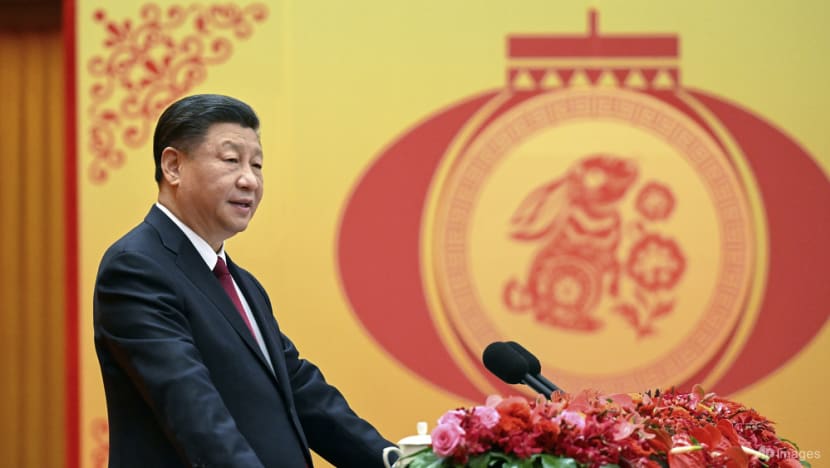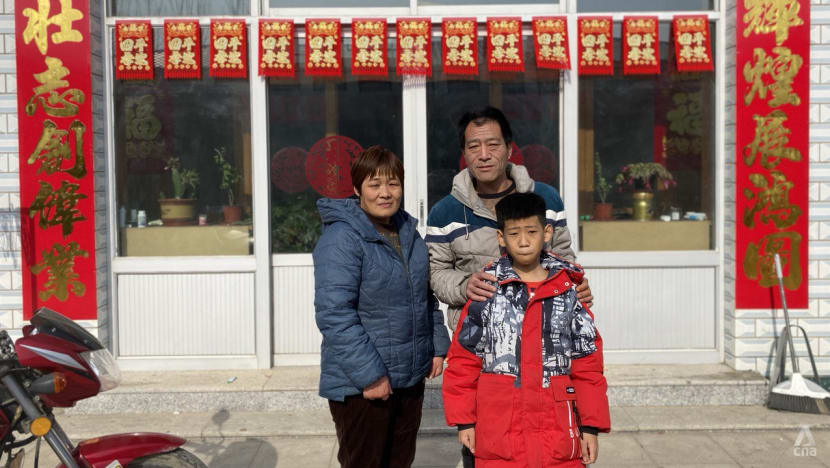All eyes on how Chinese leadership will address citizens’ concerns in upcoming annual meetings
China’s troubled relations with the United States is also likely to be in focus as the country’s top legislature convenes in Beijing.

BEIJING: From unprecedented protests to an abrupt u-turn on its zero-COVID policy, much has happened in China since President Xi Jinping secured a historic third term at the helm at a twice a decade Communist Party Congress in October last year.
Ahead of the country's annual political meetings this weekend, analysts said all eyes will be on how the Chinese leadership addresses citizens’ concerns, especially about the economy.
This comes as China is looking to reboot its economy, which had been badly hit by the country’s strict zero tolerance COVID prevention measures, growing by just 3 per cent in 2022 and missing the government’s growth target of around 5.5 per cent for the year.
The unhappiness over lockdowns, testing requirements and travel restrictions had also bubbled over into rare protests in several parts of the country.
"Today's top leadership has been reminded of the new situation in which the government is rolling out its policies. We have to pay more attention to the public voices and the public grievances among the ordinary people to implement reforms and the new policies,” said Dr Cheng Gang, assistant director at the National University of Singapore’s East Asian Institute.
LIVELIHOODS TOP OF MIND FOR CITIZENS
And their livelihoods are top of mind for such ordinary citizens.
It was a special Chinese New Year or Spring Festival for 54-year-old Wang Zhirong, who was reunited with family who returned to the village in Hebei province where she lives, as is tradition.
It was emotional moment for her as it was the first time in three years they were able to return home, after China relaxed its strict COVID-19 prevention measures at the end of last year.
But not all traditions were kept. There were no new clothes for her 14-year-old grandson this new year, as making ends meet has been tough.
Her husband, who does construction work outside the village, saw his income plunge as lockdowns restricted his movements, and projects he was working on were suspended.
Mdm Wang, who turned to sewing cloth bags at home to help pay for expenses, is glad that China has changed its stance.

"You can’t survive if you don’t go out to make money, you have nothing to spend. Look at the situation now. Even if you are living in the village and are able to farm some land, you still need money to spend," she said.
Mdm Wang and her husband said they are hopeful about the future, although things have not gone back to pre-pandemic times.
There was a similar sentiment among some small businesses.
"It should be said that it is much better than before, because after all you’re free to move about and can earn money, right? It’s much better than staying at home when I felt depressed at one point,” said 35-year-old Han Liyin, who owns cosmetics shop in a small town in Hebei’s Yutian county.
FOCUS ON ECONOMIC GROWTH
The Chinese government’s focus on economic growth comes as a necessity to reboot the economy post-COVID and to push forward other political goals, analysts said.
The private sector has been encouraged to grow in a “new normal”, noted senior China analyst at Eurasia Group Neil Thomas.
This includes a regulatory environment that emphasises the Communist Party’s role and alignment with geopolitical goals, as well as guiding private capital to invest in political priorities, such as the high-tech sector, he said.
This in a bid to mitigate the exposure to western sanctions, amid an ongoing technology war between China and the US.
“But it doesn't mean that we've seen an end to politics and command in China. It's really growth in a new political normal of maximum Xi,” he said.
Despite the mounting challenges he faces, analysts said Mr Xi’s standing is unlikely to be shaken.
Unhappiness over the zero-COVID policy has mostly dissipated, paving the way for him to be endorsed as president when the country's largely ceremonial parliament convenes.
A sweeping reshuffle of state, legislature and advisory body positions is on the cards with a new premier set to take the helm.
The new leadership is expected to be filled by Mr Xi's allies who have already been lined up in the Party's top decision-making bodies at the Communist Party Congress last year.
FOCUS ON RELATIONSHIP WITH US
China’s troubled relations with the United States is also likely to be in focus as the country’s top legislature convenes in Beijing amid an ongoing row between the two countries over an alleged Chinese spy balloon shot down by the US over its airspace.
Newly appointed Foreign Minister Qin Gang, who was previously China’s ambassador to the US, is set to field questions from the media for the first time on the sidelines of the meetings it what is typically a closely watched news conference each year.
However, analysts said they do not expect a shift in China’s foreign policy approach despite new leadership.
Continuity instead, they said, is expected as Mr Qin’s predecessor, Wang Yi, has been promoted to the Communist Party’s politburo and named its top foreign policy chief.
Also, how China deals with the rest of the world is still very much determined by Mr Xi, who remains firmly in charge.
The meetings happen at a time when China has also faced pressure to do more to rein in Moscow as the war in Ukraine drags on, crossing the one-year mark.Beijing released a position paper calling for a ceasefire and an end to western sanctions on Moscow.
US Secretary of State Antony Blinken has raised concerns that China was considering “providing lethal support” to Russia, a statement that has been called slander by Beijing.
“This is Washington trying to avert these worst-case scenarios and try to ensure that the relationship can remain at least stable, at least in the most basic sense of having dialogue and communication because if China does enter the war on Russia side, then that becomes extremely difficult and US China relations will likely enter something like a strategic freefall,” said Mr Thomas.
There had been hopes of a détente in China-US ties after a first in person meeting between the country’s two top leaders last year in Bali. But now, that has given way to concerns that the balloon saga could also spill over into other areas where China faces sovereignty issues.
This includes the South China Sea and near the self-ruled island of Taiwan, all areas where the US military operates and China views as provocation.

















